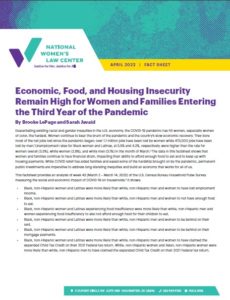Abortion rights, women of color, and LGBTQI+ people are under attack. Pledge to join us in fighting for gender justice.

 This factsheet provides an analysis of week 43 (March 2 – March 14, 2022) of the U.S. Census Bureau Household Pulse Survey measuring the social and economic impact of COVID-19 on households. It shows:
This factsheet provides an analysis of week 43 (March 2 – March 14, 2022) of the U.S. Census Bureau Household Pulse Survey measuring the social and economic impact of COVID-19 on households. It shows:
- Black, non-Hispanic women and Latinas were more likely than white, non-Hispanic men and women to have lost employment income.
- Black, non-Hispanic women and Latinas were more likely than white, non-Hispanic men and women to not have enough food to eat.
- Black, non-Hispanic women and Latinas experiencing food insufficiency were more likely than white, non-Hispanic men and women experiencing food insufficiency to also not afford enough food for their children to eat.
- Black, non-Hispanic women and Latinas were more likely than white, non-Hispanic men and women to be behind on their rent.
- Black, non-Hispanic women and Latinas were more likely than white, non-Hispanic men and women to be behind on their mortgage payments.
- Black, non-Hispanic women and Latinas were more likely than white, non-Hispanic men and women to have claimed the expanded Child Tax Credit on their 2021 Federal tax return. White, non-Hispanic women and Asian, non-Hispanic women were more likely than white, non-Hispanic men to have claimed the expanded Child Tax Credit on their 2021 Federal tax return.

